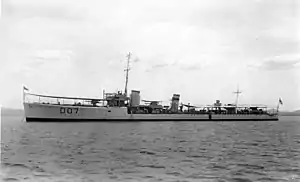HMS Somme (1918)
HMS Somme was an Admiralty S-class destroyer built for the Royal Navy during World War I. commissioned seven days before the end of the war, the ship was sold for scrap in 1932.
 Somme at anchor near Hong Kong, August, 1928 | |
| History | |
|---|---|
| Name: | Somme |
| Ordered: | 9 April 1917 |
| Builder: | Fairfield Shipbuilding & Engineering, Govan |
| Laid down: | November 1917 |
| Launched: | 10 September 1918 |
| Commissioned: | 4 November 1918 |
| Fate: | Sold for scrap, August 1932 |
| General characteristics (as built) | |
| Class and type: | S-class destroyer |
| Displacement: | 1,000 long tons (1,016 t) (normal) |
| Length: | 276 ft (84.1 m) o/a |
| Beam: | 26 ft 8 in (8.1 m) |
| Draught: | 9 ft 10 in (3 m) |
| Installed power: |
|
| Propulsion: | 2 Shafts; 1 steam turbine |
| Speed: | 34 knots (63 km/h; 39 mph) |
| Range: | 2,100 nmi (3,900 km; 2,400 mi) at 15 knots (28 km/h; 17 mph) |
| Complement: | 82 |
| Armament: |
|
Description
The Admiralty S class were larger and faster versions of the preceding R class.[1] The ships had an overall length of 276 feet (84.1 m), a beam of 26 feet 8 inches (8.1 m) and a deep draught of 9 feet 10 inches (3 m). They displaced 1,000 long tons (1,016 t) at normal load. The ships' complement was 82 officers and ratings.[2]
The ships were powered by a single Brown-Curtis geared steam turbine that drove two propeller shafts using steam provided by three Yarrow boilers. The turbines developed a total of 27,000 shaft horsepower (20,000 kW) and gave a maximum speed of 36 knots (67 km/h; 41 mph). Somme reached a speed of 33.7 knots (62.4 km/h; 38.8 mph) during her sea trials.[3] The ships carried enough fuel oil to give them a range of 3,500 nautical miles (6,500 km; 4,000 mi) at 15 knots (28 km/h; 17 mph).[2]
The Admiralty S-class ships were armed with three single QF 4-inch (102 mm) Mark IV guns. One gun was positioned on the forecastle, the second was on a platform between the funnels and the third at the stern. They were equipped with a single QF 2-pounder (40 mm (1.6 in)) "pom-pom" anti-aircraft gun on a platform forward of the mainmast. They were also fitted with two rotating twin mounts for 21-inch (533 mm) torpedoes amidships and two 18-inch (450 mm) torpedo tubes, one on each broadside abaft the forecastle.[4]
Construction and career
Somme, the first ship of her name to serve in the Royal Navy,[5] was ordered on 9 April 1917 as part of the Eleventh War Programme from Fairfield Shipbuilding & Engineering Company. The ship was laid down at the company's Govan shipyard in November 1917, launched on 10 August 1918 and commissioned on 4 November.[6]
She was recommissioned on 15 December 1920.[7] The ship re-commissioned at Portsmouth with 2/5ths crew on 4 December 1923 for service with the Eighth Destroyer Flotilla of the Atlantic Fleet.[8] Somme served on the China Station during 1927–1929 and conducted anti-piracy patrols.[9] The ship was sold for breaking in August 1932.[6]
References
- Gardiner & Gray, p. 85
- Friedman, p. 297
- March, p. 215
- Gardiner & Gray, p. 86; March, p. 219
- Colledge, p. 326
- Friedman, p. 311
- The Navy List. (January, 1921). p. 865
- The Navy List. (April, 1925). p. 271.
- https://www.kcl.ac.uk/library/archivespec/documents/archivesdocs/china.pdf
Bibliography
- Colledge, J. J.; Warlow, Ben (2006) [1969]. Ships of the Royal Navy: The Complete Record of all Fighting Ships of the Royal Navy (Rev. ed.). London: Chatham Publishing. ISBN 978-1-86176-281-8.
- Friedman, Norman (2009). British Destroyers: From Earliest Days to the Second World War. Barnsley, UK: Seaforth Publishing. ISBN 978-1-84832-049-9.
- Gardiner, Robert & Gray, Randal, eds. (1985). Conway's All The World's Fighting Ships 1906–1921. London: Conway Maritime Press. ISBN 0-85177-245-5.
- March, Edgar J. (1966). British Destroyers: A History of Development, 1892–1953; Drawn by Admiralty Permission From Official Records & Returns, Ships' Covers & Building Plans. London: Seeley Service. OCLC 164893555.